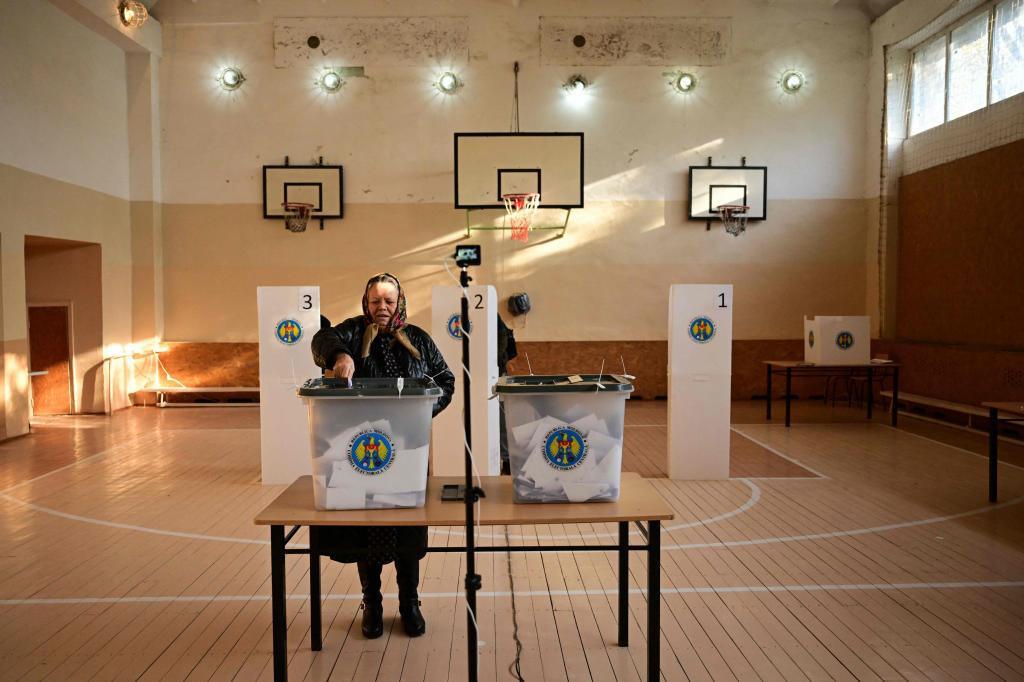After nearly 99% of votes were counted in the referendum held Sunday that asked voters to choose whether to enshrine in the country's constitution a path toward the EU, the "Yes" vote crept into first place with 50.18% of a total 1.4 million ballots cast, according to the Central Electoral Commission.
More than 200,000 ballots cast among the country's large diaspora tended to favor the EU path and were being counted overnight. A loss would be a political disaster for the pro-Western government, which strongly supported the pro-EU campaign.
"Criminal groups, working together with foreign forces hostile to our national interests, have attacked our country with tens of millions of euros, lies and propaganda, using the most disgraceful means to keep our citizens and our nation trapped in uncertainty and instability," said President Maia Sandu after about 90% of the votes were counted.
"We have clear evidence that these criminal groups aimed to buy 300,000 votes — a fraud of unprecedented scale," Sandu added. "Their objective was to undermine a democratic process."
The vote was held amid ongoing claims by Moldovan authorities that Moscow has intensified a "hybrid war" campaign to destabilize the country and derail its EU path. The allegations include funding pro-Moscow opposition groups, spreading disinformation, meddling in local elections and backing a major vote-buying scheme.
In the presidential race that was held at the same time, Sandu won the first round with 42% of the vote in a field of 11, but failed to win an outright majority. She will face Alexandr Stoianoglo, a Russia-friendly former prosecutor general who outperformed polls with around 26% of the vote, in a runoff on Nov. 3.
By the time polls closed at 9 p.m. Sunday, more than 1.5 million voters — about 51% of eligible voters — had cast ballots, according to the Central Electoral Commission.
Cristian Cantir, a Moldovan associate professor of international relations at Oakland University, told The Associated Press that polls might have "overestimated the pro-EU feeling" inside Moldova, which would have failed to pass without votes from outside the country.
"It's going to be particularly problematic because ... it's going to feed into narratives that are pushed by the Kremlin and pro-Russian forces," he said.
U.S. national security spokesman John Kirby echoed Russian interference concerns this week, saying in a statement that "Russia is working actively to undermine Moldova's election and its European integration." Moscow has repeatedly denied it is interfering in Moldova.
In early October, Moldovan law enforcement said it had uncovered a massive vote-buying scheme orchestrated by Ilan Shor, an exiled pro-Russia oligarch who currently resides in Russia, which paid 15 million euros ($16.2 million) to 130,000 individuals to undermine the two ballots.
Shor was convicted in absentia last year of fraud and money laundering and sentenced to 15 years in prison in the case of $1 billion that went missing from Moldovan banks in 2014. He denied the allegations, saying the payments were legal and citing a right to freedom of expression. Shor's populist Russia-friendly Shor Party was declared unconstitutional last year and banned.
On Thursday, Moldovan authorities foiled another plot in which more than 100 young Moldovans received training in Moscow from private military groups on how to create civil unrest around the two votes. Some also attended "more advanced training in guerrilla camps" in Serbia and Bosnia, police said, and four people were detained for 30 days.
A pro-Western government has been in power in Moldova since 2021, a year after Sandu won the presidency. A parliamentary election will be held next year.
Moldova, a former Soviet republic with a population of about 2.5 million, applied to join the EU in the wake of Russia's full-scale invasion of neighboring Ukraine on Feb. 24, 2022, and was granted candidate status that summer, alongside Ukraine. Brussels agreed in June to start membership negotiations.
